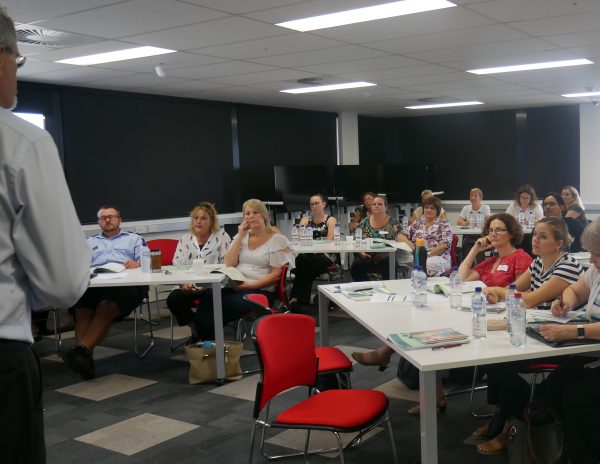The past weeks have been all-consuming for the trainers and those who assist them at QCDFVR. By the end of November, the Common Risk and Safety Framework (CRASF) Training will have been delivered in Brisbane, Logan, Moreton, Mackay, Cairns, and Mount Isa, with Ipswich and Cherbourg to follow in December. As well, stakeholders in six of these sites will have had access to a tailored Professional Development Workshop, facilitated by Mark Walters, prior to the Christmas break. Mark and Judy Pidcock have been on the road and in the air for most of the past months, taking CRASF, and other training, around the big state we call home.
It has been a feat of coordination on the part of Janine, Margaret and Maree to arrange the venues and catering for each CRASF session, and coordinate attendee registrations and trainer travel and accommodation. Thank you to the team for a wonderful effort.
On a number of occasions I’ve had the privilege of joining in these sessions. I continue to be inspired by the diversity of skills and talent of those who are working in the sector. The women and children of Queensland have great champions on the frontline. Their work is complemented by that of their counterparts, working tirelessly to hold the perpetrators of domestic and family violence to account for their actions.
Among the other learning I’ve taken from my visits to sites is how much our education and training is valued. For example, one stakeholder in western Queensland who had just completed CQUniversity’s Postgraduate Diploma in Domestic and Family Violence Practice described it as “wonderful” and added on how much it had helped them in their role with the local High Risk Team.
A matter of days later, this (unsolicited!) email arrived in my in-box from an organisation who has accessed training from CQU through QCDFVR over recent years:
We value our relationship with Central Queensland University and we look forward progressing this productive relationship. The leadership from CQU demonstrates the willingness of CQU to support industry partnerships that promote proactive approaches to addressing violence in our communities and to seeking to address violence against women and children. As an organisation that works with many of the women and children who have been adversely affected by domestic and family violence we welcome the opportunity to partner with CQU and to continue to work toward creating communities where violence no longer exists.
We also value the commitment from CQU to the professional development of our employees. I have also realised that over the past few years that Judy has come to be viewed as a quasi-employee… with a number of people talking about how much they admire Judy and respect her as a training facilitator.
Meanwhile, our trainers in the Brisbane South PHN catchment area have continued to inform and enthuse the staff of general practices to play their part in recognising and responding to domestic and family violence.
In effect, this means that over the course of 2018 alone, the QCDFVR training crew has influenced a vast range of disciplines- social workers, nurses, counsellors, psychologists, teachers, doctors, and other allied health professionals and support personnel- to understand more about violence against women. The need for more education has been acknowledged in a raft of contemporary policies, and across disciplines- but there is much work to be done!
So I’ll leave the “last words” to a neat summary from our colleagues in the social work field- where it has been recognised that it is time for
… researchers, educators, and practitioners to educate current students and veteran social workers regarding domestic violence… It has been over 10 years since social workers who were working with survivors of domestic violence and conducting research in the area issued a call to their colleagues to lead the way in addressing the issue of domestic violence and to intervene accordingly. Let us act now. The social work profession is poised to ensure that we are educating all of our workers on the history and prevalence of domestic violence as well as how to appropriately connect clients to resources, options, and appropriate intervention strategies. Crabtree-Nelson, Grossman & Lundy, 2016, p. 360
Crabtree-Nelson, S., Grossman, S., & Lundy, M. (2016). A Call to Action: Domestic Violence Education in Social Work. Social Work, 61(4), 359-362.

